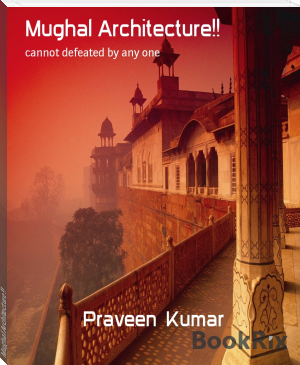The Brethren - H. Rider Haggard (love novels in english .TXT) 📗

- Author: H. Rider Haggard
Book online «The Brethren - H. Rider Haggard (love novels in english .TXT) 📗». Author H. Rider Haggard
The wilderness was red with blood, the air was rent with shouts of victory and cries of agony or despair. And there, in the midst of it all, ringed round with grave, courteous Saracens, stood the emir, clad above his mail in his white robe and jewelled turban, facing the great Christian knight, with harness hacked and reddened, the light of battle shining in his fierce eyes, and a smile upon his stained features.
For those who watched the battle was forgotten--or, rather, its interest was centred on this point.
"It will be a good fight," said one of them to Godwin, whom they had suffered to rise, "for though your brother is the younger and the heavier man, he is hurt and weary, whereas the emir is fresh and unwounded. Ah! they are at it!"
Hassan had struck first and the blow went home. Falling upon the point of Wulf's steel helm, the heavy, razoredged scimitar glanced from it and shore away the links from the flap which hung upon his shoulder, causing the Frank to stagger. Again he struck, this time upon the shield, and so heavily that Wulf came to his knees.
"Your brother is sped," said the Saracen captain to Godwin, but Godwin only answered:
"Wait."
As he spoke Wulf twisted his body out of reach of a third blow, and while Hassan staggered forward with the weight of the missed stroke, placed his hand upon the ground, and springing to his feet, ran backwards six or eight paces.
"He flies!" cried the Saracens; but again Godwin said, "Wait." Nor was there long to wait.
For now, throwing aside his buckler and grasping the great sword in both his hands, with a shout of "A D'Arcy! A D'Arcy!" Wulf leapt at Hassan as a wounded lion leaps. The sword wheeled and fell, and lo! the shield of the Saracen was severed in two. Again it fell, and his turbaned helm was cloven. A third time, and the right arm and shoulder with the scimitar that grasped it seemed to spring from his body, and Hassan sank dying to the ground.
Wulf stood and looked at him, while a murmur of grief went up from those who watched, for they loved this emir. Hassan beckoned to the victor with his left hand, and throwing down his sword to show that he feared no treachery, Wulf came to him and knelt beside him.
"A good stroke," Hassan said faintly, "that could shear the double links of Damascus steel as though it were silk. Well, as I told you long ago, I knew that the hour of our meeting in war would be an ill hour for me, and my debt is paid. Farewell, brave knight. Would I could hope that we should meet in Paradise! Take that star jewel, the badge of my House, from my turban and wear it in memory of me. Long, long and happy be your days."
Then, while Wulf held him in his arms, Saladin came up and spoke to him, till he fell back and was dead.
Thus died Hassan, and thus ended the battle of Hattin, which broke the power of the Christians in the East.
Chapter Nineteen(Before the Walls of Ascalon)
When Hassan was dead, at a sign from Saladin a captain of the Mameluks named Abdullah unfastened the jewel from the emir's turban and handed it to Wulf. It was a glorious star-shaped thing, made of great emeralds set round with diamonds, and the captain Abdullah, who like all Easterns loved such ornaments, looked at it greedily, and muttered:
"Alas! that an unbeliever should wear the enchanted Star, the ancient Luck of the House of Hassan!" a saying that Wulf remembered.
He took the jewel, then turned to Saladin and said, pointing to the dead body of Hassan:
"Have I your peace, Sultan, after such a deed?"
"Did I not give you and your brother to drink?" asked Saladin with meaning. "Whoever dies, you are safe. There is but one sin which I will not pardon you--you know what it is," and he looked at them. "As for Hassan, he was my beloved friend and servant, but you slew him in fair fight, and his soul is now in Paradise. None in my army will raise a blood feud against you on that score."
Then dismissing the matter with a wave of his hand, he turned to receive a great body of Christian prisoners that, panting and stumbling like over-driven sheep, were being thrust on towards the camp with curses, blows and mockery by the victorious Saracens
Among them the brethren rejoiced to see Egbert, the gentle and holy bishop of Nazareth, whom they had thought dead. Also, wounded in many places, his hacked harness hanging about him like a beggar's rags, there was the black-browed Master of the Templars, who even now could be fierce and insolent.
"So I was right," he mocked in a husky voice, "and here you are, safe with your friends the Saracens, Sir Knights of the visions and the water-skins--"
"From which you were glad enough to drink just now," said Godwin. "Also," he added sadly, "all the vision is not done." And turning, he looked towards a blazoned tent which with the Sultan's great pavilion, and not far behind it, was being pitched by the Arab camp-setters The Master saw and remembered Godwin's vision of the dead Templars.
"Is it there that you mean to murder me, traitor and wizard?" he asked.
Then rage took hold of Godwin and he answered him:
"Were it not for your plight, here and now I would thrust those words down your throat, as, should we both live, I yet shall hope to do. You call us traitors. Is it the work of traitors to have charged alone through all this host until our horses died beneath us?"--he pointed to where Smoke and Flame lay with glazing eyes--"to have unhorsed Saladin and to have slain this prince in single combat?" and he turned to the body of the emir Hassan, which his servants were carrying away.
"You speak of me as wizard and murderer," he went on, "because some angel brought me a vision which, had you believed it, Templar, would have saved tens of thousands from a bloody death, the Christian kingdom from destruction, and yonder holy thing from mockery," and with a shudder he glanced at the Rood which its captors had set up upon a rock not far away with a dead knight tied to its black arms. "You, Sir Templar, are the murderer who by your madness and ambition have brought ruin on the cause of Christ, as was foretold by the count Raymond."
"That other traitor who also has escaped," snarled the Master.
Then Saracen guards dragged him away, and they were parted.
By now the pavilion was up and Saladin entered it, saying:
"Bring before me the king of the Franks and prince Arnat, he who is called Reginald of Chatillon."
Then a thought struck him, and he called to Godwin and Wulf, saying:
"Sir Knights, you know our tongue; give up your swords to the officer--they shall be returned to you--and come, be my interpreters."
So the brethren followed him into the tent, where presently were brought the wretched king and the grey-haired Reginald de Chatillon, and with them a few other great knights who, even in the midst of their misery, stared at Godwin and Wulf in wonderment. Saladin read the look, and explained lest their presence should be misunderstood:
"King and nobles, be not mistaken. These knights are my prisoners, as you are, and none have shown themselves braver to-day, or done me and mine more damage. Indeed, had it not been for my guards, within the hour I should have fallen beneath the sword of Sir Godwin. But as they know Arabic, I have asked them to render my words into your tongue. Do you accept them as interpreters? If not, others must be found."
When they had translated this, the king said that he accepted them, adding to Godwin:
"Would that I had also accepted you two nights gone as an interpreter of the will of Heaven!"
The Sultan bade his captains be seated, and seeing their terrible thirst, commanded slaves to bring a great bowl of sherbet made of rose-water cooled with snow, and with his own hand gave it to king Guy. He drank in great gulps, then passed the bowl to Reginald de Chatillon, whereon Saladin cried out to Godwin:
"Say to the king it is he and not I who gives this man to drink. There is no bond of salt between me and the prince Arnat."
Godwin translated, sorrowfully enough, and Reginald, who knew the habits of the Saracens, answered:
"No need to explain, Sir Knight, those words are my death-warrant. Well, I never expected less."
Then Saladin spoke again.
"Prince Arnat, you strove to take the holy city of Mecca and to desecrate the tomb of the Prophet, and then I swore to kill you. Again, when in a time of peace a caravan came from Egypt and passed by Esh-Shobek, where you were, forgetting your oath, you fell upon them and slew them. They asked for mercy in the name of Allah, saying that there was truce between Saracen and Frank. But you mocked them, telling them to seek aid from Mahomet, in whom they trusted. Then for the second time I swore to kill you. Yet I give you one more chance. Will you subscribe the Koran and embrace the faith of Islam? Or will you die?"
Now the lips of Reginald turned pale, and for a moment he swayed upon his seat. Then his courage came back to him, and he answered in a strong voice:
"Sultan, I will have none of your mercy at such a price, nor do I bow the knee to your dog of a false prophet, who perish in the faith of Christ, and, being weary of the world, am content to go to Him."
Saladin sprang to his feet, his very beard bristling with wrath, and drawing his sabre, shouted aloud:
"You scorn Mahomet! Behold! I avenge Mahomet upon you! Take him away!" And he struck him with the flat of his scimitar.
Then Mameluks leapt upon the prince. Dragging him to the entrance of the tent, they forced him to his knees and there beheaded him in sight of the soldiers and of the other prisoners.
Thus, bravely enough, died Reginald de Chatillon, whom the Saracens called prince Arnat. In the hush that followed this terrible deed king Guy said to Godwin:
"Ask the Sultan if it is my turn next."
"Nay," answered Saladin; "kings do not kill kings, but that truce-breaker has met with no more than his deserts."
Then came a scene still more dreadful. Saladin went to the door of his tent, and standing over the body of Reginald, bade them parade the captive Templars and Hospitallers before him. They were brought to the number of over two hundred, for it was easy to distinguish





Comments (0)